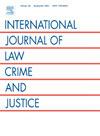Penalty effect of China's Plea Leniency System: Evidence from theft cases
IF 1.4
4区 社会学
Q3 CRIMINOLOGY & PENOLOGY
International Journal of Law Crime and Justice
Pub Date : 2025-07-16
DOI:10.1016/j.ijlcj.2025.100769
引用次数: 0
Abstract
While there is broad consensus regarding the existence of a plea-trial sentencing disparity, there remains debate over whether the disparity reflects only a plea discount or also includes a trial penalty. The evolution of China's criminal justice system provides a unique natural experiment for disentangling the underlying sources of this disparity. An empirical analysis of China's 442,873 theft case judgments between 2014 and 2020 reveals that compared to pre-implementation, defendants who do not plead guilty are subject to a 5.3 %–6.3 % increase in their custodial sentences, more fines, and a reduced probability of receiving probation. Further analysis reveals that the penalty effect is associated with the severity of the crime and processing efficiency. Within the framework of focal concerns theory, one possible explanation is that defendants who refuse to plead guilty are perceived as more dangerous, culpable, and less amenable to rehabilitation, while demands for efficiency and performance appraisal function as significant practical constraints. Our findings enable a deeper understanding of China's Plea Leniency System and the nature of plea-trial sentencing disparity in the trial-avoiding mechanism.
中国认罪宽大制度的刑罚效果:来自盗窃案的证据
尽管对于认罪与审判之间的量刑差异存在广泛共识,但对于这种差异是否仅反映认罪减让,还是也包括审判处罚,仍存在争议。中国刑事司法制度的演变为解开这种差异的根本根源提供了一个独特的自然实验。对2014年至2020年中国442,873起盗窃案判决的实证分析表明,与执行前相比,不认罪的被告刑期增加5.3% - 6.3%,罚款增加,缓刑的可能性降低。进一步分析表明,刑罚效果与犯罪的严重程度和处理效率有关。在焦点问题理论的框架内,一种可能的解释是,拒绝认罪的被告被认为是更危险、更有罪、更不容易改过自新,而对效率和考绩的要求则是重大的实际限制。本文的研究结果有助于我们更深入地了解中国的认罪宽大制度,以及回避审判机制中认罪量刑差异的本质。
本文章由计算机程序翻译,如有差异,请以英文原文为准。
求助全文
约1分钟内获得全文
求助全文
来源期刊
CiteScore
2.70
自引率
0.00%
发文量
25
审稿时长
47 days
期刊介绍:
The International Journal of Law, Crime and Justice is an international and fully peer reviewed journal which welcomes high quality, theoretically informed papers on a wide range of fields linked to criminological research and analysis. It invites submissions relating to: Studies of crime and interpretations of forms and dimensions of criminality; Analyses of criminological debates and contested theoretical frameworks of criminological analysis; Research and analysis of criminal justice and penal policy and practices; Research and analysis of policing policies and policing forms and practices. We particularly welcome submissions relating to more recent and emerging areas of criminological enquiry including cyber-enabled crime, fraud-related crime, terrorism and hate crime.

 求助内容:
求助内容: 应助结果提醒方式:
应助结果提醒方式:


